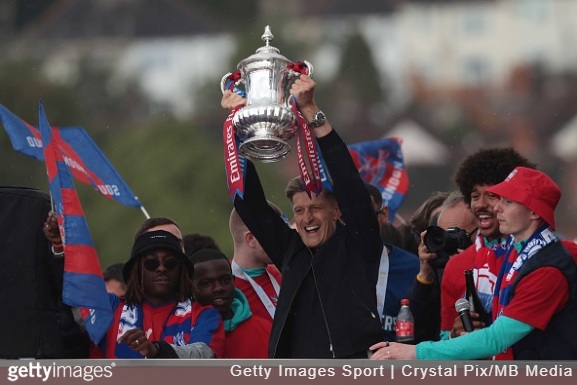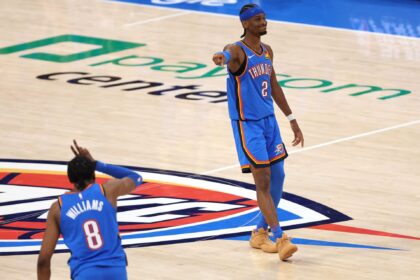Crystal Palace’s surprising entry into the Europa League is now facing a significant hurdle due to UEFA’s regulations on multi-club ownership, jeopardizing their aspirations in European competition. The central figure in this predicament is John Text, an American investor who holds a 43% share in Crystal Palace and controls 88% of Olympique Lyon. UEFA regulations forbid anyone from exerting “critical influence” over two clubs in the same tournament to avoid conflicts of interest and maintain the competition’s integrity.
Steve Parish, the president of Crystal Palace and its public representative, has been proactively engaging with UEFA, advocating that the club should not be classified as part of a multi-club framework. He contends that Text’s involvement does not represent a critical influence, especially since Text’s actual voting power is limited to 25%, with other stakeholders like Josh Harris and David Blitzer joining Parish in decision-making.
Text has expressed frustration over his perceived lack of control within the club. Despite Parish’s arguments, UEFA’s focus is less on public perceptions and more on formal legal documents that outline ownership and control. The potential legal implications may still pose risks for Crystal Palace.
Though complex, these circumstances highlight a significant moment in contemporary football. The rise of underdog clubs like Crystal Palace is increasingly threatened by the escalating commercialization of sport. Their stellar season, which exceeded expectations with a coveted European berth, risks being overshadowed by governance failures rather than poor performance or scandals. This is a bitter irony for a club traditionally known for its grit and genuine fan culture.
Fans have long sensed issues with ownership. Over a year ago, supporters unfurled banners at Selhurst Park criticizing the multi-club ownership and calling out Text directly. These early warnings went largely unaddressed, as ownership has prioritized short-term gains over sustainable compliance. As UEFA scrutiny grows, the repercussions of past neglect could be serious.
Recent reports indicate that the club has missed a vital deadline to place the organization in blind trust, a procedure that could have alleviated the situation. This method was successfully used by Evangelos Marinakis at Nottingham Forest to avoid similar conflicts with Olympiacos. Whether supporters are in favor of or against Palace’s European ambitions, the decisions made now could greatly affect their future.
The unfolding drama reflects a broader crisis in football governance. The sport is more reactive than proactive, marked by fragmented regulations and inconsistent policies. Presently, over 400 clubs are involved in multi-club ownership across nearly 150 networks globally. Given the magnitude of this trend, FIFA has yet to provide a clear definition of what constitutes a “club,” leading to ambiguity in enforcement. Many in the industry criticize UEFA for its lack of transparency and its apparent favoritism towards wealthier clubs.
Certainly, Crystal Palace does not belong to the elite echelon of European clubs, making their situation particularly dire. There’s a prevailing sentiment that established clubs rarely face scrutiny in these matters. The European Clubs Association (ECA), led by PSG’s Nasser Al Khelaifi, advocates for the continent’s major clubs, while Parish seeks to represent medium-sized clubs in the European Union of Clubs (UEC) that are often marginalized in elite discussions. This political dynamic adds another layer of complexity for Crystal Palace.
This case extends beyond a single club; it exemplifies the current contradictions in football. It’s a global sport rooted in local identities, but increasingly dominated by a financial and legal framework that often conflicts with fan values and club traditions. Clubs like Strasbourg and Troy, now under the multi-club umbrella of larger entities like Chelsea and City Football Group, have effectively relinquished their autonomy, serving as pawns in the strategies of their parent clubs. This trend often reflects the wealthiest and most powerful organizations. There’s concern that the essence of football—competitive community spirit and unpredictability—is fading in favor of a streamlined, profit-driven model.
Crystal Palace’s Europa League qualification could have been a remarkable narrative in modern football. Instead, it serves as a cautionary tale about the perils of unregulated ownership and UEFA’s outdated regulatory framework. There is hope that UEFA will take a lenient stance, acknowledging Palace’s unique circumstances and the minimal actual control Text wields. But even if the club is permitted to compete, doubts linger over the legitimacy of their achievements, illuminating the instability of success in today’s game.
This situation highlights the urgent need for reform. Football authorities must clarify ownership rules and apply them uniformly and justly. Clubs need to take greater ownership of compliance with governance standards. Meanwhile, fans have long recognized the potential consequences, urging deeper involvement in the management of the clubs they support. Their voices serve as a rallying cry as Crystal Palace awaits UEFA’s verdict in trepidation. Soccer must confront what it wishes to embody—community-driven sport or a business-first industry.
In conclusion, Crystal Palace’s Europa League aspirations are threatened by an ownership model that has evolved beyond the regulations designed to contain it. Unless football’s governing bodies act decisively and transparently, stories similar to Palace’s will become more frequent and disheartening.
Fan Take: This situation matters deeply to soccer fans because it highlights the growing chasm between corporate interests and grassroots traditions. If clubs like Crystal Palace become casualties of an unregulated ownership model, the very essence of football as a community-driven sport may be at stake, emphasizing the need for meaningful reform.



